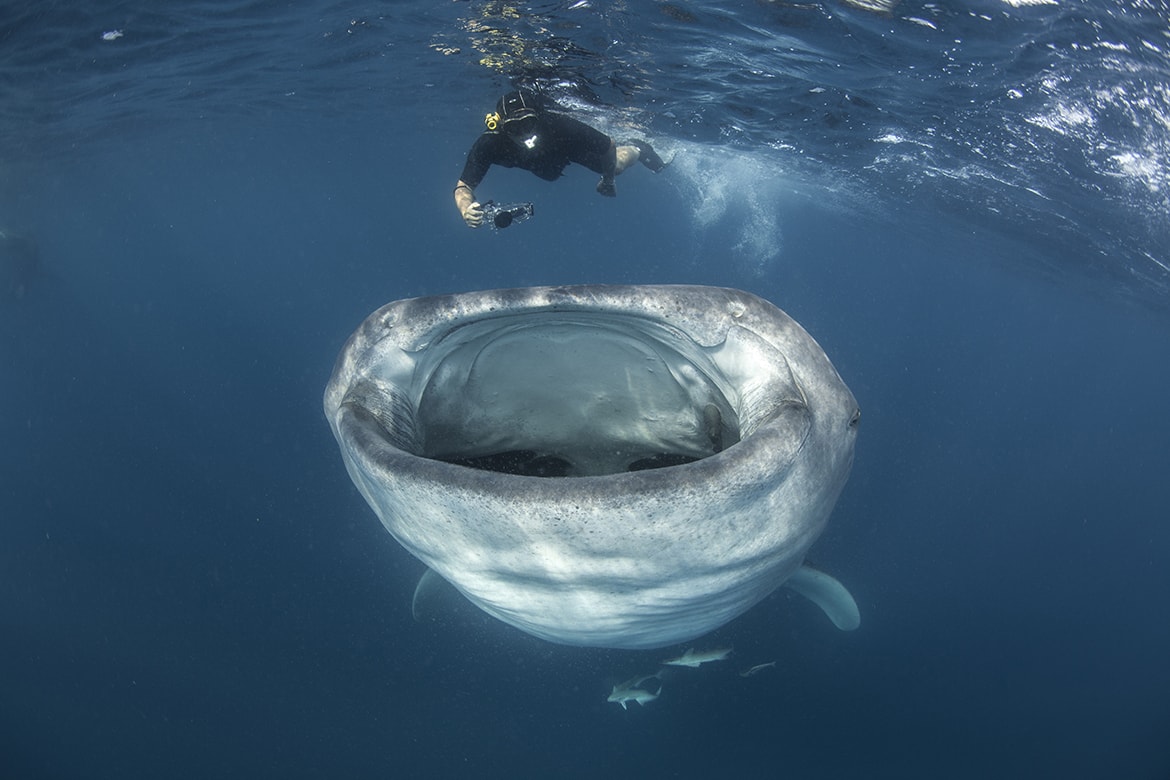
Canon EOS 5D Mark II, EF16-35mm f/2.8L II USM lens, f/3.2, 1/100, 16mm, ISO500
Majestic migrations of Whale Sharks
Few of us will ever have the opportunity to experience extreme conditions, much less dive in them. We all know that the oceans have their mysteries, but what happens when temperatures dip below zero? We learn more from underwater photographer Raymond Man as he takes us beneath the surface.

Canon EOS 5D, EF100mm f/2.8 Macro USM lens, f/16, 1/100sec, 100mm, ISO200
A Mantis shrimp protecting its eggs
Hey Raymond! We understand you were recently shooting in the Russian Arctic Circle – tell us about that.
The one thing that was strange to wrap my head around was that above the surface, temperatures would dip to -20 to -30 degree Celsius, but the water itself was only 1 degree Celsius! I got to capture beautiful moments of mating animals and them laying eggs, for which I’m grateful for the speed of my 5D – its quick FPS capabilities really came in handy in those moments.

Canon EOS 5D Mark II, EF100mm f/2.8L Macro IS USM lens, f/13, 1/160, 100mm, ISO250
The Nudibranch was really active, despite how cold the water was
What were some of your concerns shooting in such conditions?
I was worried that the camera wouldn’t be able to operate at such temperatures. It is known that in some extreme conditions like in the North Pole, your camera wouldn’t be able to work. The trick is to assemble all your equipment in a warm place and take it out right before your dive. I’ve learnt that if the water is at 0 degree Celsius, it doesn’t affect the camera much.
Thing is, I have been a Canon 5D user since 2006, and have experienced all three generations of the camera, so I know what I’m saying when I say this camera is really tough. It has accompanied me as I witnessed the change of the oceans, and we have all faced many challenges together. It is my ultimate photography partner.

Canon EOS 5D, EF100mm f/2.8 Macro USM lens, f/11, 1/200sec, 100mm, ISO100
A Harlequin Shrimp consuming its favourite delicacy, the Starfish
Tell us about some of the challenges you faced.
The biggest challenge for me was to be diving in absolute darkness, not knowing what I would encounter and what I can shoot. The deeper it gets, the darker it becomes so at some point, you start feeling a little lost. At times like this, a powerful flash and light source is a must, but I got to say that the Canon 5D series has really amazing high ISO capabilities, which really helps shooting!

Canon EOS 5D Mark II, EF15mm f/2.8 Fisheye lens, f/6.3, 1/320sec, 15mm, ISO320
The Whale Shark is so large, it could swallow a diver whole
Another challenge I faced was that I had to wear a dry suit, which really limited my movements and made me significantly less agile. You definitely have to wear gloves, which makes pressing the shutter fairly inconvenient. However, all these issues cease to matter when you see a beluga whale approaching!

Canon EOS 5D, EF100mm f/2.8 Macro USM lens, f/16, 1/60sec, 100mm, ISO200
The Porcelain Crab lives in between corals and uses its unique feelers to feed
We hear that you take videos too. How’s that experience like?
I like shooting short videos. The thing about underwater photography/videography is that you are working within a limited time frame, and I love how fast my camera is because so far, I’ve never missed any shooting opportunities, despite the speed marine life moves at in their natural habitat. It has its challenges of course – it’s hard to focus when you shoot videos underwater, especially when the camera is housed in a water-proof case that doesn’t allow for manual focusing. I like how I can grab stills and shoot videos with just one click, and the results have never let me down. It’s amazing how far technology has come – you hardly need bulky, heavy equipment anymore and you never compromise on quality.

Canon EOS 5D Mark III, EF100mm f/2.8L Macro IS USM lens, f/32, 1/160, 100mm, ISO320
Pygmy Seahorse I managed to capture. It was just 1cm big!
Ultimately, all underwater photographers seek to tell stories through our work of the beauty of the oceanic world and the creatures that inhabit it. We want to educate people to appreciate and to treasure such natural beauty. At one point, I was helping my government build a biodiversity photo library that would be used by universities, and produced many educational ocean documentaries for the general audience, which is my contribution towards environmental conservation.
I’d also like to shoot penguins in the South Pole one day though, they are just too cute!

Canon EOS 5D Mark II, EF16-35mm f/2.8L II USM lens, f/8, 1/125sec, 16mm, ISO400
Receive the latest updates on photography news, tips and tricks by signing up with us!
About the Author
www.raymondman.com

































